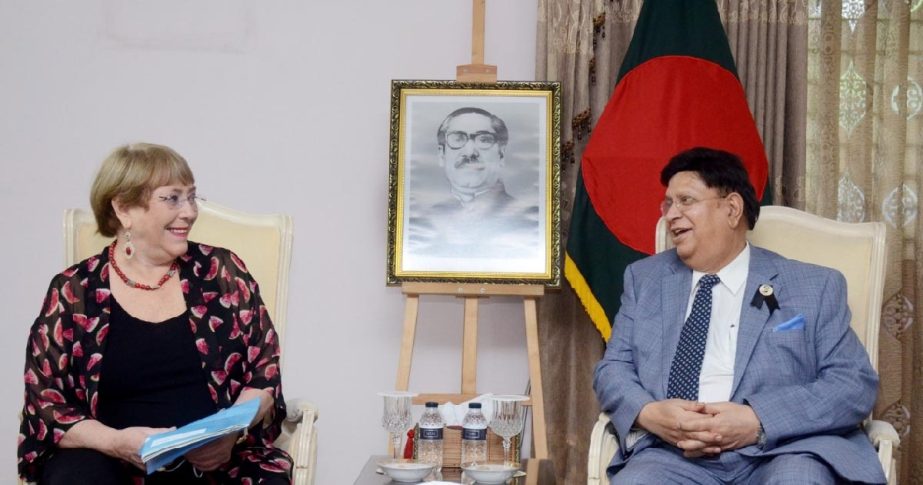
UNB, Dhaka :
Bangladesh has conveyed to visiting UN High Commissioner for Human Rights Michelle Bachelet that there is no “enforced disappearance” and no restrictions on media freedom and civil society in the country.
While talking to reporters after his meeting with Bachelet at state guesthouse Padma, Foreign minister AK Abdul Momen said the UN rights chief did not raise the issue of extrajudicial killings or enforced disappearance but the Bangladesh side raised it on its own.
“They (UN side) did not raise the issue of extrajudicial killings. They (UN) were informed that some people had been killed. We said we’ll definitely investigate if there is any such information,” he said, adding that he did not hear about any such incident in recent days but there were such cases in 2002-2003.
Momen referred to an open letter to the UN rights chief by David Bergman, Editor of Netra News (English) and said they (Bergman and others) are very unhappy and going through kind of mental pains as Bangladesh is progressing.
“Some people are giving them (Bergman and others) money. They are paid persons,” he said, mentioning that he heard they (Bergman and others) work in favour of those who pay them.
Momen also recalled the role of Bergman during the trial of war criminals as he heard that Bergman used to work in exchange for money.
The foreign minister also told the UN rights chief that the perception of restrictions on media freedom is not true. “I see the media is very strong here.”
Responding to a question, Momen said they (UN side) are very concerned about the Rohingya issue.
Bachelet thanked Bangladesh for its generosity towards the Rohingyas, but at the same time they want an increased support to the Rohingyas, he said.
Momen briefed Bachelet about the government’s efforts to protect and promote human rights in the country.
The Bangladesh side urged her to extend their support in Rakhine state for creating a conducive environment for the Rohingya repatriation.

The top executive of the UN Human Rights body will also have the opportunity to interact with the forcibly displaced Rohingya people during her trip to Cox’s Bazar, through which she would be equipped with concrete information to press hard the agenda for their repatriation to the ancestral homeland – Rakhine State of Myanmar, said the Ministry of Foreign Affairs.
Bachelet arrived here on Sunday morning on a four-day visit as Bangladesh continues “constructive dialogue” with her for the promotion and protection of human rights.
Before her arrival in Dhaka, the government strongly rejected what it says the visible “politically motivated efforts” of some corners to mislead the people by showcasing the visit of the UN High Commissioner as an occasion to “put undue pressure” on the government.
“The government of Bangladesh firmly believes that politicization of the human rights agenda never helps in promoting and protecting human rights of the people; and therefore, sincere dialogue and cooperation is the pathway,” said the government early Saturday.
Bachelet, who was an elected president of Chile on two occasions (2006 – 2010 and 2014 – 2018), is scheduled to meet Prime Minister Sheikh Hasina on Wednesday morning.
Apart from her meetings with the Cabinet members of the government, she is scheduled to interact with the National Human Rights Commission, youth representatives, leaders of the civil society organizations (CSOs) and the academia during her stay in Dhaka.
She would also pay homage to Father of the Nation Bangabandhu Sheikh Mujibur Rahman at Bangabandhu Memorial Museum on August 15.
Bachelet will also join an interactive session on “New Frontiers of Human Rights: Climate Justice in Perspective” with young scholars at the Bangladesh Institute of International and Strategic Studies on Wednesday after her meeting with PM Hasina.
Bangladesh hoped to benefit from an objective appreciation of the High Commissioner regarding the achievements of the country, despite challenges.
The visiting UN High Commissioner remains well aware of the plethora of achievements of Bangladesh in the human rights domain, including through the treaty-body reporting as well as through other mechanisms, Bangladesh says.
Bangladesh hoped that the chief of UN human rights mechanism would witness by herself how the country is doing miracles to keep on track their development journey; integrating human rights into it.
Despite the ongoing pandemic, no one in the country has died of starvation, said the government, adding that “No one is getting killed either in shopping malls, schools or worship places in Bangladesh.”

